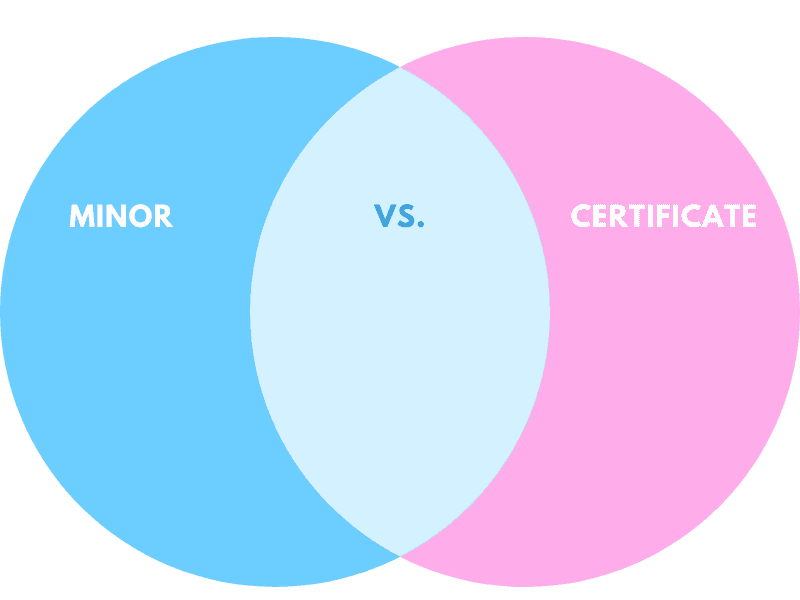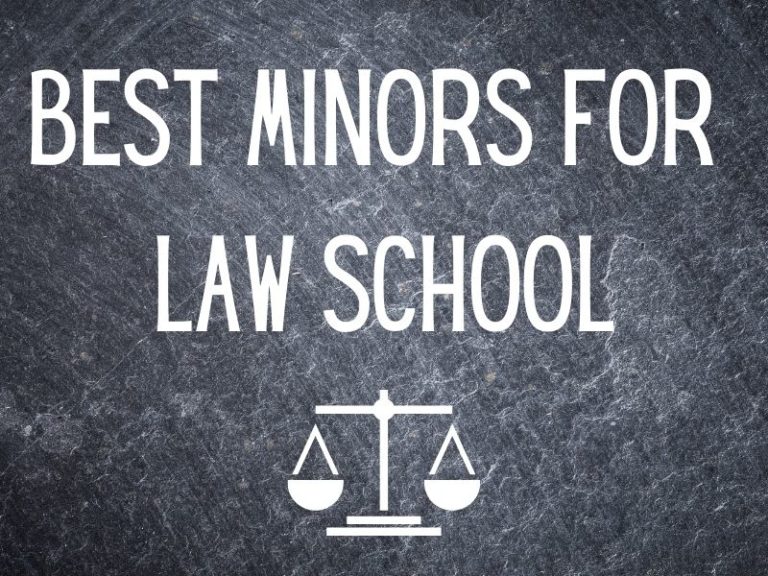Minor vs. Certificate: Key Differences
The knowledge and skills you acquire in college can spell the difference between a lackluster resume and endless career opportunities. Earning a minor and getting a certificate are wonderful options. However, it can be confusing as to which of the two you should opt for, mainly because they seem to fulfill the same academic goals.
A minor, which is secondary to a major, is declared and committed to by a bachelor’s degree student. On the other hand, a certificate can be pursued whether or not a student is an undergraduate or in college or not. Both a minor and a certificate can be taken concurrently with a bachelor’s degree.
Still scratching your head after that brief explanation?
Continue reading. By the time you reach the end of this article, you will have a better idea of whether it’s a minor or a certificate you should get.
Key Differences Between Minor and Certificate

Most degree programs have both majors and minors.
They can be completed, too, without minors if the college or university allows their students to skip taking minors. If you are not interested in declaring a minor, you may instead go for a certificate if the school you are attending permits it.
You can think of a minor as a mini-major. On the other hand, you can think of a certificate as a mini-minor.
A minor is made up of a group of classes around a specific subject matter, which can be related to your major or not. It typically consists of 18 to 30 credits.
A certificate is also comprised of a group of classes associated with a particular subject matter. However, unlike a minor, it usually only consists of nine credits but it can go up to 30 credits, too.
One important thing you need to know about a minor is that you can take it only if you have a major or a degree program, which has a major. It’s due to this why it’s ideal to declare a minor and a major at the same time.
On the other hand, a certificate can be completed with or without a major.
Many certificates are stand-alone, too, which means that high school graduates out of college and working professionals may choose to complete them. After all, certificates are designed not only to provide an additional dimension to one’s academic record but also to enhance a person’s resume.
You can think of both a minor and a certificate as a bragging right. However, a minor usually appears on the transcript only, although it may also show up on a diploma, such as one obtained from UCLA.
A certificate, just like a minor, also appears on the transcript. However, a separate credential is usually awarded to the student, too. What’s more, in some instances, a certificate also allows one to put the credential after his or her name, which can make anyone look experienced and suited for the job.
Due to this, it doesn’t come as a surprise why many people say that the certificates they earned in college helped increase their job market value. As a matter of fact, a lot of employers ask applicants if they have certificates.
And this takes us to question anyone interested in minors and certificates like to ask…
Should You Choose A Minor Or A Certificate
When choosing between a minor and a certificate, one’s goals for getting it should be taken into account. A student earning a bachelor’s degree may opt for either a minor or a certificate, or both. On the other hand, a student completing an associate or master’s degree may go for a certificate only.
You should know your reason for wanting either a minor or a certificate before you go for it. Having a clear idea of why you want to spend extra time and money on it will help simplify the selection process.
If you are completing a bachelor’s degree program, in most instances, it’s a good idea to complete a minor rather than a certificate. One reason for this is the fact that a minor is more common among undergraduate students.
So, in other words, going for a minor can keep a potential employer from wondering why you took a certificate instead.
There is nothing wrong with opting for a certificate in college. This is especially true if you have a clear idea of the career path you like to take after college.
While a minor can be chosen because it has something to do with one’s major or aligns with the student’s hobbies or interests, a certificate is usually chosen to advance one’s degree program.
So, in other words, it can serve as an additional credential that can impress potential employers when it’s time to apply for a job.
Related Article: Can You Get a Job With a College Minor?
Besides, while there are certificates available for all, not everyone can have a minor. For instance, someone who is a high school graduate but has not enrolled in college or a person who has already completed a bachelor’s degree is not eligible for a minor.
On the other hand, they are entitled to get a certificate.
And while we’re still on the subject, let’s take a look at this question requiring an answer…
Differences Between A Certificate And Certification
Basically, a certificate is proof of education. It is usually awarded by a learning institution. On the other hand, certification is proof of passing an exam or completing a training, seminar, or any other similar activity to meet industry standards. It is usually awarded by an organization.
A certificate and certification may sound like they are one and the same.
While their first few letters are alike, a certificate and certification are two different things. They vary when it comes to who takes them and what awards them. For instance, a certificate is ideal for college students and professionals alike. In contrast, a certification is more suited for people with work or professional experience.
Choosing between a minor and a certificate is complicated enough for many students. And those who wish to get a certificate should also know the differences between that and a certification.
Take a look at this table that compares the two:
| MINOR | CERTIFICATION | |
|---|---|---|
| Provider | Learning institutions or programs | National or non-profit organizations |
| Completion | Less than a year to three years | A couple of sessions to less than six months |
| Credits earned | Transferrable in many cases | N/A |
| Indication | Completion of a course or courses | Mastery or competency |
| Candidates | Students and professionals | Professionals |
| Award | Inclusion on the transcript | Credential listed after one’s name |
| Expiration | For life | On-going requirements to maintain |
As a general rule of thumb, if you’re in college earning a degree, it’s a certificate that you may opt for, with or without a minor.
Go for certification if you’re a working adult and you wish to improve your credentials, demonstrate commitment to your profession and build your self-esteem for better employment opportunities or a job promotion.
Besides the things that make it different from a certification, anyone who plans on getting a certificate should also know the different certificates to choose from. They are.
- Vocational certificate. Also sometimes referred to as a vocational degree, a vocational certificate is suited for students with a high school diploma or an equivalent, such as a General Educational Development (GED) certificate. Simply put, a vocational certificate prepares students for work in specific trades, such as automotive repair, plumbing, appliance repair and cosmetology. Vocational certificates are generally cheaper than traditional degrees. Some of them can take as long as an associate degree to complete. However, the majority of vocational certificates can be completed in a matter of months or sometimes even weeks.
- Undergraduate certificate. As long as you are a college student, you can choose to get your hands on an undergraduate certificate. This is true whether you are pursuing an associate degree or a bachelor’s degree. Some undergraduate certificates, however, are only available for full-time college students. They usually consist of nine to 30 credits, which are transferable from college to college in many instances.
- Post-baccalaureate certificate. Worry not if you decided to get a certificate only after completing your bachelor’s degree and getting a job. That’s because there are various post-baccalaureate certificates for you to choose from. It’s the perfect certificate for those who wish to advance their careers by obtaining in-depth knowledge in an area associated with their professions. Some students who do not qualify for master’s degree programs choose to complete post-baccalaureate certificates instead.
- Post-master’s certificate. As the name suggests, a post-master’s certificate is intended for students who have already completed their master’s degrees. More often than not, the post-master’s certificate taken is related to one’s graduate degree earned. Some students get their hands on a post-master’s certificate to help them decide whether or not to enroll in a doctorate program.
Going back to a college minor, let’s answer this pressing question…
Does A Minor Count As A Degree?
A minor doesn’t count as a degree. It is an academic discipline secondary to a major, which provides a college degree the focus that it needs. A student can earn a college degree without declaring and committing to a minor. On the other hand, a student cannot earn a college degree without a major.
There is really no limit to the number of minors a student may take and complete.
However, it’s a terrible idea to go for numerous minors as it’s certain that one’s graduation timetable will be compromised. If you take multiple minors, your classmates will likely have climbed the corporate ladder long before you graduate.
Bachelor’s degree students, on average, take one to two minors. Some take three minors, depending on how strict or lenient the colleges or universities they are attending when it comes to the declaration of minors.
It’s possible for a minor to become a degree, provided that it’s completed with other minors.
In some instances, students can customize their degree plans to meet their specific academic needs and interests.
Boise State University, which is a public research university in Boise, Idaho, offers the Triple Discipline or 3D program. Simply put, it allows its students to combine three minors into a custom-made major.
Minor vs. Concentration
A lot of college students have a hard time separating a minor and a certificate from each other. Similarly, many of them have a difficult time deciding whether they could benefit more from earning a minor or getting a certificate.
The mere mention of a concentration can make things more complicated right away.
It’s a good thing that you will find it easier to figure out what a concentrate means, especially after determining the key differences between a minor and a certificate.
That’s because concentration is more associated with a minor. It’s very rare for it to be talked about when a certificate is a matter being discussed.
Let’s answer this pressing question to get things started…
Difference Between A Minor And Concentration
A minor may or may not supplement a major. For instance, some students minor in courses in pursuit of their hobbies and interests. A concentration, on the other hand, is a plan of study within the major. Unlike a minor, a concentration is always related to a major and designed to supplement it.
Like a minor and a certificate, it may appear as though a minor and concentration are similar at first glance. It’s true that they have similarities. However, their key differences make it clear that they are different things.
One of the nicest things about a minor is that you can choose just about any course you like.
This means that you may opt for something that complements your chosen major or something that goes well or enhances your interest. So, needless to say, you have 100% control over which minor to declare.
A concentration, on the other hand, is chosen not based on one’s pursuit or passion but on a student’s major. It’s because it is meant to emphasize a certain area within your major.
For instance, you can minor in Comics Studies while majoring in Physics just because you love reading superhero comic books — although the superpowers of superheroes are notorious for defying the laws of physics.
On the other hand, a concentration in Computer Science can prove to be extremely beneficial for any future physicist.
While there are differences between a minor and concentration, they have some similarities:
- Available to bachelor’s degree students only. There is one thing a minor and concentration share. And it’s none other than the fact that a major has to be around before a student can declare and commit to either one of them. Without a major, it’s not a bachelor’s degree that a student is earning. So, in other words, you can choose to earn a minor or concentration if you are enrolled in a bachelor’s degree program.
- May or may not be taken. Whether you are short of money or you just want to complete your college as soon as you can, you may skip getting your hands on a minor or concentration. Needless to say, completing a minor or concentration is not a college requirement, although having a minor is a must in some institutions. However, you may fail to have a well-rounded college experience and a more impressive academic record if you choose to skip a minor or concentration, but you absolutely can.
- Both of them can take up precious time. No matter your chosen minor or concentration, one thing remains true: it takes time to complete them. A minor, if required, accounts for about 15% of the requirements of a bachelor’s degree. On the other hand, a concentration accounts for at least 30% of the requirements of a major. So, it goes without saying that a concentration usually takes a much longer time to earn than a minor.
Conclusion
A minor and a certificate are the same in that they provide you knowledge and skills.
However, while you can complete a certificate whether you are a college student or not, you can only get your hands on a minor if you are an undergraduate student. That’s because there has to be a major for a minor to be available.
So, in other words, a minor is only for somebody pursuing a bachelor’s degree, while a certificate is for someone pursuing an associate, bachelor’s or master’s degree or not currently trying to earn any degree — he or she can be a fresh high school graduate or a working adult who graduated from college years ago.
While somewhat the same but entirely different from one another, both a minor and a certificate share something in common. And it’s none other than the fact that they take time and money to complete.
Before deciding if it’s a minor you want or a certificate you need, consider important factors such as your college load and graduation timetable.
You should also take into account your reason for trying to earn either a minor or a certificate. If it seems like one can do more harm than good, then it’s a good idea to opt for the other.
Read Also: 20 Most Employable Degrees
Disclaimer: The views and opinions expressed in this article are those of the authors and do not necessarily represent those of the College Reality Check.





